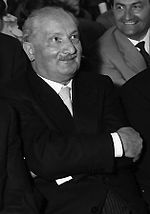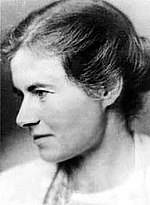Martin Heidegger (/ˈhaɪdɛɡər, ˈhaɪdɪɡər/; German: [ˈmaʁtiːn ˈhaɪdɛɡɐ]; 26 September 1889 – 26 May 1976) was a German philosopher best known for contributions...
110 KB (12,850 words) - 17:42, 9 January 2025
Philosopher Martin Heidegger joined the Nazi Party (NSDAP) on May 1, 1933, ten days after being elected Rector of the University of Freiburg. A year later...
99 KB (13,303 words) - 13:08, 17 November 2024
Heideggerian terminology (redirect from Late Martin Heidegger)
Martin Heidegger, the 20th-century German philosopher, produced a large body of work that intended a profound change of direction for philosophy. Such...
56 KB (7,573 words) - 08:16, 10 December 2024
Blochmann's affair (over many decades) with her philosophical teacher Martin Heidegger. It is probably fair to say that, after that with Hannah Arendt, she...
13 KB (1,461 words) - 21:49, 3 November 2024
God is dead (section Martin Heidegger)
one's hands." Martin Heidegger understood Nietzsche’s declaration "God is dead" as a commentary on the end of metaphysics. For Heidegger, Nietzsche’s statement...
22 KB (3,031 words) - 23:40, 5 January 2025
Dasein (category Martin Heidegger)
technical term in the philosophy of Martin Heidegger. Adopted from the ordinary German word Dasein meaning "existence", Heidegger used it to refer to the mode...
17 KB (2,058 words) - 16:34, 11 January 2025
Being and Time (category Books by Martin Heidegger)
(German: Sein und Zeit) is the 1927 magnum opus of German philosopher Martin Heidegger and a key document of existentialism. Being and Time had a notable...
33 KB (3,610 words) - 19:37, 6 January 2025
Aletheia (category Martin Heidegger)
in the works of 20th-century philosopher Martin Heidegger. Although often translated as "truth", Heidegger argued that it is distinct from common conceptions...
8 KB (852 words) - 17:49, 29 November 2024
of phenomenology approach subjectivity. For example, according to Martin Heidegger, truths are contextually situated and dependent on the historical,...
48 KB (5,606 words) - 10:39, 12 January 2025
most associated with contemporaneous philosophers Jean-Paul Sartre, Martin Heidegger, Simone de Beauvoir, Karl Jaspers, Gabriel Marcel, Paul Tillich, and...
94 KB (11,742 words) - 20:49, 14 January 2025
philosophical approach developed by Edmund Husserl and later expanded on by Martin Heidegger that concentrates on the study of consciousness and the objects of...
42 KB (5,420 words) - 15:30, 28 September 2024
Heidegger Gesamtausgabe is the title of the collected writings of German philosopher Martin Heidegger (1889-1976), published by Vittorio Klostermann.: ix–xiii ...
33 KB (4,393 words) - 09:31, 9 November 2024
education in Berlin, Arendt studied at the University of Marburg under Martin Heidegger, with whom she engaged in a romantic affair that began while she was...
265 KB (26,404 words) - 13:58, 15 January 2025
Abandonment (existentialism) (section Martin Heidegger)
controlled individual will. The first to do so were Jean-Paul Sartre and Martin Heidegger. According to Sartre, there are three schools of philosophical thought...
8 KB (1,165 words) - 17:27, 11 November 2024
Philippe Lacoue-Labarthe (category Translators of Martin Heidegger)
extensively on Martin Heidegger, Jacques Derrida, Jacques Lacan, German Romanticism, Paul Celan, and Gérard Granel. He also translated works by Heidegger, Celan...
12 KB (809 words) - 10:30, 21 August 2024
Being in itself (category Martin Heidegger)
in the works of Martin Heidegger, Jean-Paul Sartre, Simone de Beauvoir, and the existentialists. In the philosophy of Martin Heidegger, Being-in-itself...
5 KB (673 words) - 02:37, 2 June 2022
The Question Concerning Technology (category Books by Martin Heidegger)
Frage nach der Technik) is a work by Martin Heidegger, in which the author discusses the essence of technology. Heidegger originally published the text in...
11 KB (1,371 words) - 13:21, 27 October 2024
Hermeneutics (category Martin Heidegger)
Husserl, Martin Heidegger. Both researchers attempted to pull out the lived experiences of others through philosophical concepts, but Heidegger's main difference...
62 KB (7,173 words) - 17:46, 14 January 2025
course by Martin Heidegger first published in 1953. The work is notable for a discussion of the Presocratics and for illustrating Heidegger's supposed...
13 KB (1,419 words) - 13:04, 17 November 2024
In Being and Time, the philosopher Martin Heidegger makes the distinction between ontical and ontological, or between beings and being as such. He labeled...
6 KB (651 words) - 16:57, 13 December 2024
Ontotheology (category Martin Heidegger)
philosophical parlance with the significance it took for Martin Heidegger's later thought. While, for Heidegger, the term is used to critique the whole tradition...
14 KB (1,777 words) - 19:43, 26 November 2024
The Origin of the Work of Art (category Books by Martin Heidegger)
philosopher Martin Heidegger. Heidegger drafted the text between 1935 and 1937, reworking it for publication in 1950 and again in 1960. Heidegger based his...
15 KB (2,068 words) - 13:06, 17 November 2024
doctoral degree at Freiburg with a dissertation on Stimmung, or mood, in Martin Heidegger. In 2000, he joined the Department of Philosophy at the University...
23 KB (2,212 words) - 10:47, 3 January 2025
Metaphysics of presence (category Martin Heidegger)
of presence (German: Metaphysik der Anwesenheit) is a view held by Martin Heidegger in Being and Time that holds the entire history of Western philosophy...
672 bytes (54 words) - 15:28, 23 October 2024
Philosophy of education (section Martin Heidegger)
responsible for many of the psychological disorders of adulthood. Martin Heidegger's philosophizing about education was primarily related to higher education...
128 KB (14,370 words) - 13:38, 5 September 2024
Edmund Husserl (category Martin Luther University of Halle-Wittenberg alumni)
Ott, Martin Heidegger, Unterwegs zu seiner Biographie. Campus Verlag p.168, Walter Biemel "Erinnerungsfragmente" in Erinnerung an Martin Heidegger Neske...
100 KB (12,418 words) - 17:36, 14 January 2025
Facticity (category Martin Heidegger)
Between Facts and Norms (Faktizität und Geltung). German philosopher Martin Heidegger (1889–1976) discusses "facticity" as the "thrownness" (Geworfenheit)...
5 KB (543 words) - 16:21, 20 October 2024
Thrownness (category Martin Heidegger)
(German: Geworfenheit) is a concept introduced by German philosopher Martin Heidegger (1889–1976) to describe humans' individual existences as being 'thrown'...
9 KB (864 words) - 17:13, 30 October 2024
poststructuralists, include Charles Darwin, Hans Georg Gadamer, G. W. F. Hegel, and Martin Heidegger. Rorty challenged the notion of a mind-independent, language-independent...
127 KB (14,794 words) - 16:27, 17 January 2025
Phenomenological description (section Martin Heidegger)
of by Edmund Husserl. It was developed through the latter work of Martin Heidegger, Jean-Paul Sartre, Emmanuel Levinas and Maurice Merleau-Ponty — and...
7 KB (829 words) - 05:42, 27 September 2023












